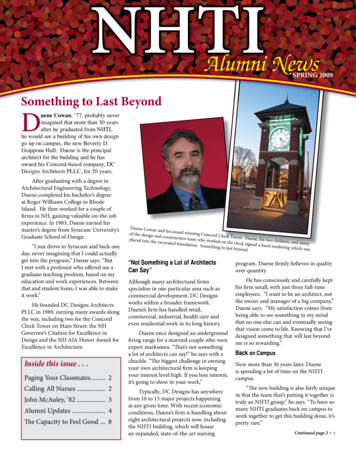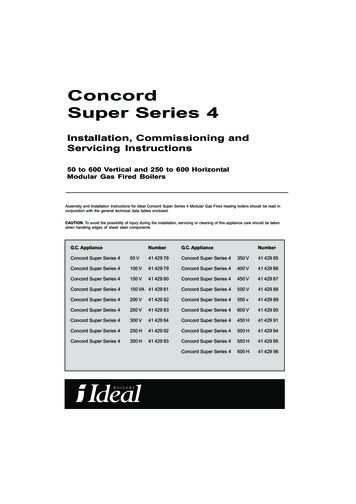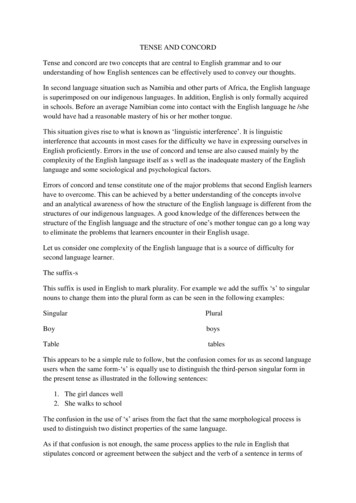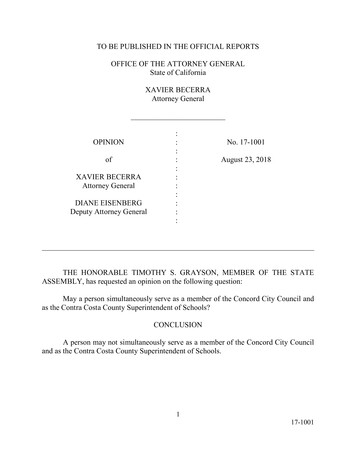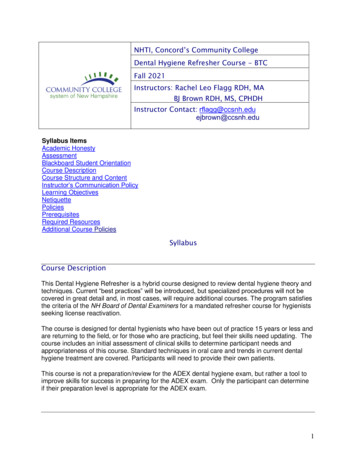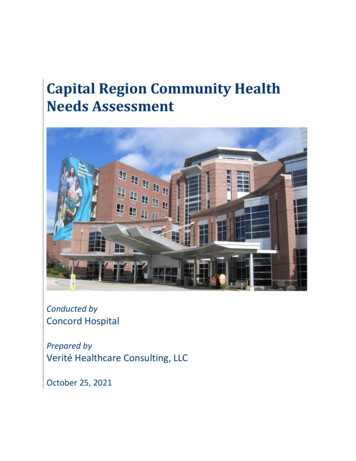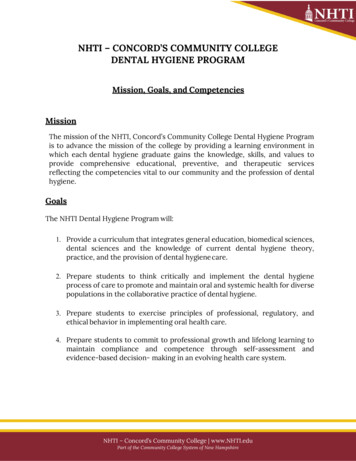
Transcription
NHTI – CONCORD’S COMMUNITY COLLEGEDENTAL HYGIENE PROGRAMMission, Goals, and CompetenciesMissionThe mission of the NHTI, Concord’s Community College Dental Hygiene Programis to advance the mission of the college by providing a learning environment inwhich each dental hygiene graduate gains the knowledge, skills, and values toprovide comprehensive educational, preventive, and therapeutic servicesreflecting the competencies vital to our community and the profession of dentalhygiene.GoalsThe NHTI Dental Hygiene Program will:1. Provide a curriculum that integrates general education, biomedical sciences,dental sciences and the knowledge of current dental hygiene theory,practice, and the provision of dental hygiene care.2. Prepare students to think critically and implement the dental hygieneprocess of care to promote and maintain oral and systemic health for diversepopulations in the collaborative practice of dental hygiene.3. Prepare students to exercise principles of professional, regulatory, andethical behavior in implementing oral health care.4. Prepare students to commit to professional growth and lifelong learning tomaintain compliance and competence through self-assessment andevidence-based decision- making in an evolving health care system.NHTI – Concord’s Community College www.NHTI.eduPart of the Community College System of New Hampshire
CompetenciesThe NHTI Dental Hygiene Program identified and organized the knowledge, skills,and values required for entry into the dental hygiene profession. Students mustdemonstrate an accepted level of performance of professional activities, whichillustrate intellectual, affective, and psychomotor abilities to complete the programand graduate. Competencies define the relevant core content of the curriculum andprovide a guideline for faculty decision-making concerning course content,sequencing, and teaching methodologies. Competencies for the dental hygienegraduate are organized in three domains: (1) Professionalism, (2) Health Promotionand Disease Prevention, and (3) Patient Care. Each domain delineates into majorcompetencies, supporting competencies, and foundational knowledge. Majorcompetencies refer to the more complex tasks, which require multiple abilities andthe development of critical thinking skills. These multiple abilities are reflected insupporting competencies, which require a specific level of mastery andfoundational knowledge. Foundational knowledge, a prerequisite for supportingcompetencies, is a result of didactic and laboratory instruction. The foundationalknowledge provides a foundation matrix for the entire dental hygiene educationalprocess and is defined in the specific objectives in individual course outlines.ProfessionalismIn the rapidly changing health care environment, the dental hygienist must be ableto discern ethical issues and problems in dental hygiene practice, utilize criticalthinking skills and sound judgment, and communicate with other health careprofessionals.1. Ethics. The new dental hygiene graduate must be able to discern and managethe ethical issues facing dental hygiene practice in a rapidly changingenvironment.Specifically, the new dental hygiene graduate must be able to:1.11.21.31.4Apply ethical principles relevant to dental hygieneIntegrate the ADHA Code of Ethics in all dental hygiene endeavorsValue every patient’s right to dental hygiene care consistently provided at thecurrent standard of careAdhere to local, state, and federal laws, recommendations, and regulations forthe practice of dental hygieneNHTI – Concord’s Community College www.NHTI.eduPart of the Community College System of New Hampshire
2. Information Processing. The new dental hygiene graduate must be able toacquire and synthesize information in a critical, scientific, and effectivemanner.Specifically, the new dental hygiene graduate must be able to:2.12.22.32.4Critically analyze evidence based oral health researchApply evidence-based decision making to dental hygiene practiceEvaluate the safety and efficacy of oral health care products, interventions,and treatmentsCommunicate professional knowledge in verbal and written form, using theprinciples of scientific writing3. Professional Identity. The new dental hygiene graduate must contribute toimproving the knowledge, skills, and values of the profession.Specifically, the new dental hygiene graduate must be able to:3.13.23.33.43.53.6Advance the profession through leadership, service activities, and affiliationwith professional organizations.Assume the roles of the professional dental hygienist includingeducator, researcher, entrepreneur, public health professional, andadministrator, as well as those employed in corporate settings.Promote the value and mission of the profession to the communityand other stakeholdersAccept responsibility and accountability for self-evaluation of dentalhygiene practiceAssume responsibility and value professional growth through continuedlife- long learningPromote positive values of oral health in the overall health andwellness of the patient and community within and outside theprofession of dental hygiene.Health Promotion and Disease PreventionThe dental hygienist serves the community as a partner in the collaborativepractice of dental hygiene utilizing an interprofessional, holistic approach. Thedental hygienist must be competent in the assessment, performance and deliveryof oral health promotion and disease prevention services for individuals and thecommunity.NHTI – Concord’s Community College www.NHTI.eduPart of the Community College System of New Hampshire
4. The Community. The new dental hygiene graduate must be able to initiateand assume responsibility for health promotion and disease preventionactivities for diverse populations in a variety of settings.Specifically, the dental hygiene graduate must be able to:4.14.24.3Promote preventive health behaviors by personally maintaining optimal oral andoverall healthIdentify the oral health needs of individuals and assist them in thedevelopment of appropriate and individualized oral self- care plansEncourage patients to accept responsibility for their health andpromote adherence to self-care plans5. The Community. The new dental hygiene graduate must be able to initiateand assume responsibility for health promotion and disease preventionactivities for diverse populations in a variety of settings.Specifically, the dental hygiene graduate must be able to:5.15.25.35.45.55.65.75.85.9Critically analyze, identify, an utilize services that promote oral andsystemic health and prevent oral diseases and related conditionsUtilize methods that ensure the overall health and safety of the patient and oralhealth professional in the delivery of care in a variety of settings.Assess community oral health needs and available resources foroverall health improvement and access to the healthcare systemParticipate in the assessment, planning, implementation, evaluation andcontinuous surveillance of community based oral health programsCollaborate with relevant health care providers to screen, educate andrefer patients to access resources of the health care systemValue the diversity of the population and address the challenges to access tocareAdvocate for effective oral health care for underserved populationsEvaluate reimbursement mechanisms and their impact on the patient’saccess to oral health care.Communicate effectively with diverse individuals and groups,serving all persons without discrimination by acknowledging and appreciatingNHTI – Concord’s Community College www.NHTI.eduPart of the Community College System of New Hampshire
Patient CareThe dental hygienist is a licensed preventive oral health professional who provideseducational and clinical services in the support of optimal health. By utilizingbiomedical, clinical, and behavioral sciences, the dental hygienist implements thedental hygiene process of care for diverse populations while maintaining patientconfidentiality.6. Assessment. The new dental hygiene graduate must be able to systematicallycollect, correlate, critically analyze, and document data on the general oral,and psychosocial health status for diverse patients using methods consistentwith medico-legal-ethical principles.Specifically, the new dental hygiene graduate must be able 6.15Obtain, review, and update a comprehensive health history to includedemographic information, vital signs, physical characteristics, and social,medical, and pharmacological historyIdentify pre-disposing and etiological risk factors that require specialprecautions or considerations for dental hygiene carePerform an extraoral and intraoral examination and accurately document thefindingsPerform and document an examination of the hard tissue includingdental charting, occlusion, and assessment of hard and soft deposits.Perform and document an examination of the periodontiumAssess the need for radiographs, distinguish normal from abnormalradiographic findings, and correlate with clinical examinationExpose radiographs of diagnostic qualityEvaluate patient risk factors for oral diseases and conditionsObtain necessary intraoral photographsTake impressions and fabricate study modelsAssess the need for pain and anxiety managementDetermine the need for consultation or referral to appropriate health careprofessionalsIdentify patients at risk for nutritional conditions using assessmentinformationIdentify patients at risk for medical emergencies and take appropriateprecautions to minimize the risksAnalyze and interpret the data, obtain consultations when appropriate, andformulate a dental hygiene diagnosis based on patient needs as related to oralNHTI – Concord’s Community College www.NHTI.eduPart of the Community College System of New Hampshire
7. Planning. The new dental hygiene graduate must be able to formulate acomprehensive dental hygiene care plan that is evidence-based and patientcentered.Specifically, the dental hygiene graduate must be able to:7.17.27.37.47.57.6Prioritize patient needs and establish oral health goals with the patient,family, or guardian as an active participantPlan treatments that reflect the influence of behavioral, social, andcultural differences in the provision of dental health careFormulate a patient-centered comprehensive dental hygiene care plan that isbased on scientific evidence and all relevant diagnostic data and reviseplans as appropriateEstablish a planned sequence of educational, preventive, and clinical dentalhygiene services collaboratively with the patient based on the dental hygienediagnosisCommunicate the care plan to the dentist and/or interprofessional healthcare team members to determine its congruence with the overall plan fororal health careObtain informed consent after a thorough case presentation8. Implementation. The new dental hygiene graduate must be able to providespecialized care that includes educational, preventative, and therapeuticservices designed to assist the patient in achieving and maintaining oralhealth goals.Specifically, the dental hygiene graduate must be able to:8.18.28.38.48.58.68.78.88.98.10Practice infection control procedures in accordance with standards of careApply the principles of dental hygiene instrumentation to removedeposits without trauma to hard and soft tissuesUtilize radiographs of diagnostic qualityControl pain and anxiety during treatment through the use of acceptedclinical techniques and appropriate behavioral management strategiesSelect and administer appropriate chemotherapeutic agents within thescope of dental hygiene practiceProvide care for oral prosthesesFabricate custom trays and perform in-office whiteningManage medical emergencies in the patient care environmentProvide dental hygiene interventions to prevent or control oral diseaseEducate patients to prevent and control risk factors that contribute tooral disease and systemic conditionsNHTI – Concord’s Community College www.NHTI.eduPart of the Community College System of New Hampshire
9. Evaluation. The new dental hygiene graduate must be able to criticallyevaluate the effectiveness of implemented educational, preventive, andtherapeutic services and make modifications as necessary.Specifically, the dental Hygiene graduate must be able to:9.19.29.39.49.5Evaluate and document the outcomes of preventive and/or therapeuticdental hygiene interventions in achieving care plan goalsAssess and value patient satisfaction with dental hygiene care and theoral health status achievedRecommend an appropriate continuing supportive care planIdentify, recommend and document referral to relevant health careprofessionals for optimal patient care.Apply quality assurance mechanisms to ensure continuous commitment tooptimal oral health care.NHTI – Concord’s Community College www.NHTI.eduPart of the Community College System of New Hampshire
dental hygiene interventions in achieving care plan goals 9.2 Assess and value patient satisfaction with dental hygiene care and the oral health status achieved 9.3 Recommend an appropriate continuing supportive care plan 9.4 Identify, recommend and document referral to relevant health care professionals for optimal patient care.

